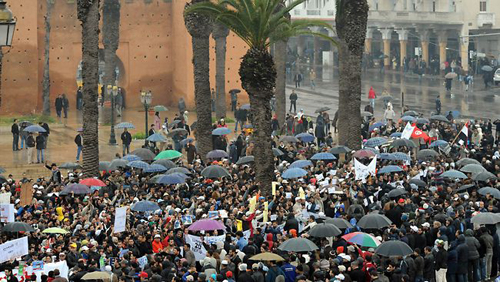- Washington “follows with interest” Morocco’s openness onto Africa (John Kerry)Posted 11 years ago
- The trial of South African Paralympic champion Oscar Pistorius opened in Pretoria on Monday.Posted 11 years ago
- USA welcomes efforts of King Mohammed VI in MaliPosted 11 years ago
- Egypt’s population reaches 94 millionPosted 11 years ago
- Mugabe celebrates his 90thPosted 11 years ago
- Moroccan Monarch to Build a Perinatal Clinic in BamakoPosted 11 years ago
- King Mohammed VI handed a donation of bovine semen for the benefit of Malian breeders.Posted 11 years ago
- Moroccan King’s strategic tour to Africa: Strengthening the will of pan African Solidarity and stimulating the south-south cooperation mechanisms over the continentPosted 12 years ago
- Senior al-Qaida leader killed in AlgeriaPosted 12 years ago
- Libya: The trial of former Prime Minister al-Baghdadi AliPosted 12 years ago
Protest marches in Morocco blown out of proportion
 Numerous observers noted lately that some news reports regarding the number of Moroccan participants to protest marches have been blown out of all proportion. Seemingly, some reporters devoted much more time to echoing false details about the number of protestors than being engrossed in digging out the real facts on the ground.
Numerous observers noted lately that some news reports regarding the number of Moroccan participants to protest marches have been blown out of all proportion. Seemingly, some reporters devoted much more time to echoing false details about the number of protestors than being engrossed in digging out the real facts on the ground.
Souhail Karam, a correspondent of Reuters, reported on the 20th of November, that “10,000 protesters had gathered in a square in the working class Beni Mkada district” in the city of Tangier. He added that “at least 6,000 people had turned up for a parallel protest (in Casablanca), despite heavy rain”. Souhail Karam also affirmed that “two western diplomats and a resident in the capital, Rabat, put the turn out for a protest there at about 3,000 people”. As for Paul Shemm (Associated Press), he affirmed, on the same day, that “at least 3,000 people marched through the capital Rabat and another 4,000 demonstrated in Casablanca”.
Prior to any attempt to reply to these totally flawed allegations, it should be reminded that among the basic deontological ethics that should be kept in mind during any event coverage are fairness and accuracy. Reporting figures blindly (without checking their exactitude) seems a crime against the profession of journalism, in general, and unfortunately downgrades the credibility of the news agencies concerned, in particular.
Different local witnesses who were present next to the above-mentioned manifestations (in Tangiers, Casablanca and Rabat), advance that the sum of the three protest marches does not exceed 5000 people, knowing that these are the cities that witness the largest numbers of protesters in Morocco.
A well-informed source, who spoke under the cover of anonymity, asserted: “even when widening the margin of error…you know… needless to mention that most often people tend to confuse people passing by with protesters …almost 1700 people manifested in Tangier, 1300 in Casablanca and 1500 in Rabat”.
Indeed, the two news articles portray a distorted image of Morocco and tend to sell some “incomplete (if not wrong) information” that can be misleading. The two articles addressed the issue of protest marches and the boycott call for the upcoming elections in the North-African country with total disregard to the following facts:
The number of people who approved the new constitution, that gives more power to the parliament and the prime minister, far exceeds the number of protesters who have been calling for boycott thus far. Suffice it to say, as a reminder, that 9,151,103 voted, on the 1st of July 2011, in the referendum for the new constitution.
Many countries with fragile democratic backgrounds have been violently ‘shaken’ by the ‘Arab Spring’. When it comes to Morocco, however, it drew the best of it and smoothly headed towards the strengthening of its democratic experience by initiating so many additional reforms. Unlike what happened in Egypt, Libya or Tunisia, the case of Morocco is unique in the sense that political and economic reforms had already been launched since the 1990s.
The upcoming parliamentary elections (Nov.25) do not represent an end in themselves but just a step towards the election of a government that will put into concrete terms the reforms, embodied in the new constitution, that have been embraced by the people and for the people.
In short, no matter how the figures of protesters have been exaggerated by some news articles, the undeniable truth is that they remain a drop in the ocean compared to the reforms launched in Morocco.
